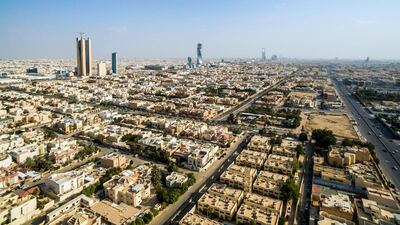A shortage of homes available for Saudi Arabia’s rapidly growing population means that there are opportunities for developers, despite the slowing economy.
Several UAE developers and contractors have expanded in the kingdom in recent years, and although it is not always the easiest place to work, most remain positive about its prospects.
Abu Dhabi-based Gulf Related, for example, is to complete the first of two proposed 1 billion Saudi riyal (Dh979 million) residential schemes in Riyadh in October. The 522-unit Antara residential community is within a secure compound offering many amenities at mainly expat renters.
Emile Habib, the managing director, said that although the number of new workers coming into Riyadh has slowed, there is plenty of demand from other sources.
“One is people living in existing compounds who want to upgrade, because many are outdated. The other is from people who have applied to get into compounds. Waiting lists are still running at six to 12 months.
“There is still a shortfall of thousands of units. That’s a general theme all over Riyadh. The demand for residential is massive.”
Year-on-year rents for apartments in Riyadh were up by 8 per cent and villas by 6 per cent in the third quarter of last year, according to JLL. Sale prices actually fell (by 5 per cent and 1 per cent respectively), but this was blamed on a government move in November 2014 to cap loan-to-value ratios on mortgages. Buyers have to come up with a 30 per cent down payment in a market where most people cannot afford their own home.
A JLL report on affordable housing published in September stated that there is a shortfall of about 400,000 affordable units across the country, and that just 30 per cent of Saudis own their own homes (compared with a global average of 70 per cent).
Hardly any parts of either Riyadh or Jeddah had homes deemed “affordable” for middle-income families – households earning between 6,000 and 20,000 riyals per month, or 62 per cent of the population.
It is an issue that the government has been attempting to tackle for years. The main obstacle is the high cost of land, which has been exacerbated in recent years by speculative traders.
A “white land tax” on undeveloped land was announced in October and will come into force in June to prevent owners sitting on land, with the levy recycled into affordable schemes.
Bilal Siddiqui, a development solutions manager for Colliers in Riyadh, said the tax is already having an effect.
“Everybody is expecting land prices to go down. And if you’re selling at a lower price, that reduces the viability of just selling land. It forces you to think about other ways of increasing the overall development value.”
Omar Al Kadi, the chief executive of Riyadh-based Injaz Development, said banks are also becoming more cautious in lending to the sector.
“The caution is now even for a single plot. This is not just because of the tax. People are trying to see if prices will go down. The tension also in the region – it’s making people more careful of spending and investing.”
He sees more of the country’s big contracting groups moving into development – partly to serve the need for more affordable housing but also to make up for a decline in construction workload – and advises developers to differentiate by concentrating on the luxury market.
Most UAE developers are already doing this. Damac’s senior vice president, Niall McLoughlin, said sales of luxury flats in two tower schemes in Riyadh “were very positive last year. We believe that this year will be no exception”.
A spokesman for Emaar Middle East, which is building master planned communities in Jeddah and Khobar, said that it would “ continue to explore new growth opportunities in the kingdom, given the gap in housing and the continued demand.
“The government’s focus on strengthening the role of the private sector provides a strong opportunity for new real estate ventures. Following the recent announcement by the leadership, more land is expected to be opened up for development.”
Emaar Middle East also said recommendations for a new real estate regulatory authority and for strengthening Islamic mortgages could also help its growth.
Craig Plumb, the head of research for JLL Mena, said that other UAE developers are likely to be tempted into the country as their home market slows.
“Due to the size of the market there are lots of clear opportunities of scale,” he said.
“However, what is also becoming clearer is that there are challenges as well. It is not entirely clear just how opportunities such as the white land tax and the affordable housing requirements will play out. If it was such a great opportunity then everybody would be over there making money.”
mfahy@thenational.ae
lbarnard@thenational.ae
Follow The National's Business section on Twitter

